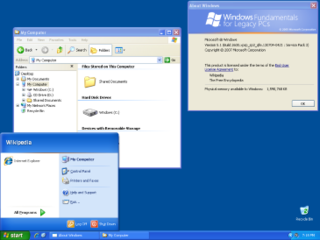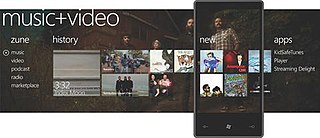Related Research Articles
Microsoft Windows is a product line of proprietary graphical operating systems developed and marketed by Microsoft. It is grouped into families and sub-families that cater to particular sectors of the computing industry -- Windows (unqualified) for a consumer or corporate workstation, Windows Server for a server and Windows IoT for an embedded system. Defunct families include Windows 9x, Windows Mobile, Windows Phone, and Windows Embedded Compact.
Bethesda Softworks LLC is an American video game publisher based in Rockville, Maryland. The company was founded by Christopher Weaver in 1986 as a division of Media Technology Limited. In 1999, it became a subsidiary of ZeniMax Media. In its first 15 years, it was a video game developer and self-published its titles. In 2001, Bethesda spun off its in-house development team into Bethesda Game Studios, leaving Bethesda Softworks to focus on publishing operations.

.tk is the Internet country code top-level domain (ccTLD) for Tokelau, a territory of New Zealand in the South Pacific.
Domain name speculation, popular as domaining in professional jargon, is the practice of identifying and registering or acquiring generic Internet domain names as an investment with the intent of selling them later for a profit.
Criticism of Microsoft has followed various aspects of its products and business practices. Issues with ease of use, robustness, and security of the company's software are common targets for critics. In the 2000s, a number of malware mishaps targeted security flaws in Windows and other products. Microsoft was also accused of locking vendors and consumers in to their products, and of not following or complying with existing standards in its software. Total cost of ownership comparisons between Linux and Microsoft Windows are a continuous point of debate.
GameSpot is an American video gaming website that provides news, reviews, previews, downloads, and other information on video games. The site was launched on May 1, 1996, created by Pete Deemer, Vince Broady and Jon Epstein. In addition to the information produced by GameSpot staff, the site also allows users to write their own reviews, blogs, and post on the site's forums. It has been owned by Fandom, Inc. since October 2022.
In trademark law, confusing similarity is a test used during the examination process to determine whether a trademark conflicts with another, earlier mark, and also in trademark infringement proceedings to determine whether the use of a mark infringes a registered trademark.

Windows Fundamentals for Legacy PCs ("WinFLP") is a thin client release of the Windows NT operating system developed by Microsoft and optimized for older, less powerful hardware. It was released on July 8, 2006, nearly two years after its Windows XP SP2 counterpart was released in August 2004, and is not marketed as a full-fledged general purpose operating system, although it is functionally able to perform most of the tasks generally associated with one. It includes only certain functionality for local workloads such as security, management, document viewing related tasks and the .NET Framework. It is designed to work as a client–server solution with RDP clients or other third party clients such as Citrix ICA. Windows Fundamentals for Legacy PCs reached end of support on April 8, 2014 along with most other Windows XP editions.
The multinational technology corporation Apple Inc. has been a participant in various legal proceedings and claims since it began operation and, like its competitors and peers, engages in litigation in its normal course of business for a variety of reasons. In particular, Apple is known for and promotes itself as actively and aggressively enforcing its intellectual property interests. From the 1980s to the present, Apple has been plaintiff or defendant in civil actions in the United States and other countries. Some of these actions have determined significant case law for the information technology industry and many have captured the attention of the public and media. Apple's litigation generally involves intellectual property disputes, but the company has also been a party in lawsuits that include antitrust claims, consumer actions, commercial unfair trade practice suits, defamation claims, and corporate espionage, among other matters.
The Xbox 360 is a home video game console developed by Microsoft. As the successor to the original Xbox, it is the second console in the Xbox series. It competed with Sony's PlayStation 3 and Nintendo's Wii as part of the seventh generation of video game consoles. It was officially unveiled on MTV on May 12, 2005, with detailed launch and game information announced later that month at the 2005 Electronic Entertainment Expo (E3).

CNET is an American media website that publishes reviews, news, articles, blogs, podcasts, and videos on technology and consumer electronics globally. CNET originally produced content for radio and television in addition to its website before applying new media distribution methods through its internet television network, CNET Video, and its podcast and blog networks.
Microsoft has been involved in numerous high-profile legal matters that involved litigation over the history of the company, including cases against the United States, the European Union, and competitors.
Microsoft Azure, often referred to as Azure, is a cloud computing platform developed by Microsoft. It offers access, management, and the development of applications and services through global data centers. It also provides a range of capabilities, including software as a service (SaaS), platform as a service (PaaS), and infrastructure as a service (IaaS). Microsoft Azure supports many programming languages, tools, and frameworks, including Microsoft-specific and third-party software and systems.
Cybersquatting is the practice of registering, trafficking in, or using an Internet domain name, with a bad faith intent to profit from the goodwill of a trademark belonging to someone else.

Microsoft Design Language, previously known as Metro, is a design language created by Microsoft. This design language is focused on typography and simplified icons, absence of clutter, increased content to chrome ratio, and basic geometric shapes. Early examples of MDL principles can be found in Encarta 95 and MSN 2.0. The design language evolved in Windows Media Center and Zune and was formally introduced as Metro during the unveiling of Windows Phone 7. It has since been incorporated into several of the company's other products, including the Xbox 360 system software and the Xbox One system software, Windows 8, Windows Phone, and Outlook.com. Before the "Microsoft design language" title became official, Microsoft executive Qi Lu referred to it as the modern UI design language in his MIXX conference keynote speech. According to Microsoft, "Metro" has always been a codename and was never meant as a final product, but news websites attribute this change to trademark issues.
Danger Close Games was an American video game developer based in Los Angeles. The company was founded in March 1995 as joint venture between DreamWorks SKG and Microsoft under the name DreamWorks Interactive, with studios in Redmond, Washington, and Los Angeles.

Microsoft Corp. v. Shah was an Anticybersquatting Consumer Protection Act (ACPA) case heard before the United States District Court for the Western District of Washington. Microsoft sued the defendants, Amish Shah and others, for, among other charges, contributory cybersquatting for encouraging others, through videos and software, to infringe on Microsoft's trademarks. The case was settled out of court in July 2011 after judge Ricardo S. Martinez denied Shah's motion for dismissal. Legal observers suggested that, if upheld, the case would prove notable for the court's expansion of the ACPA liability to include contributory cybersquatting.

Xbox is a video gaming brand that consists of five home video game consoles, as well as applications (games), streaming service Xbox Cloud Gaming, and online services such as the Xbox network and Xbox Game Pass. The brand is produced by Microsoft Gaming, a division of Microsoft.
The Xbox system software is the operating system developed exclusively for Microsoft's Xbox home video game consoles. Across the four generations of Xbox consoles, the software has been based on a version of Microsoft Windows and incorporating DirectX features optimized for the home consoles. The user interface, the Xbox Dashboard, provides access to games, media players, and applications, and integrates with the Xbox network for online functionality.
References
- 1 2 3 Kotadia, Munir (January 19, 2004). "Software giant threatens mikerowesoft". ZDNet . Retrieved March 7, 2024.
- 1 2 3 Sieberg, Daniel (January 20, 2004). "Teen fights to keep MikeRoweSoft.com". CNN . Retrieved October 1, 2008.
- ↑ Barker, Gary (January 21, 2004). "Teenager takes on a corporate monster". The Age . Melbourne. Retrieved October 2, 2008.
- ↑ "Boy swaps MikeRoweSoft for Xbox". BBC News. January 26, 2004. Retrieved October 1, 2008.
- 1 2 3 4 KOMO Staff & News Services (January 18, 2004). "Microsoft vs. Mikerowesoft". KOMO News . Retrieved March 7, 2024.
- ↑ "mikerowesoft.com whois lookup - who.is". who.is. Retrieved April 29, 2024.
- ↑ "Microsoft Not Soft On Mike Rowe". CBS News. January 20, 2004. Retrieved March 7, 2024.
- ↑ "Microsoft takes on teen over domain name". USA Today . January 19, 2004. Archived from the original on January 2, 2007. Retrieved October 8, 2008.
- ↑ "Microsoft takes on teen's site MikeRoweSoft.com". CNN. January 20, 2004. Archived from the original on May 27, 2008. Retrieved October 1, 2008.
- 1 2 3 4 5 Festa, Paul (February 2, 2004). "MikeRoweSoft sell-off bids going, going...down". CNET . Retrieved March 7, 2024.
- 1 2 Kotadia, Munir (January 26, 2004). "MikeRoweSoft settles for an Xbox". CNET . Retrieved March 7, 2024.
- 1 2 Carmichael, Amy (February 5, 2004). "Microsoft vs. mikeRowesoft ends amicably". The Globe and Mail . Retrieved March 7, 2024.
- 1 2 "Microsoft lightens up on teen's mikerowesoft site". USA Today. January 20, 2004. Archived from the original on July 1, 2010. Retrieved October 1, 2008.
- ↑ Bishop, Todd (January 21, 2004). "Mikerowesoft vs. Microsoft: The saga continues". Seattle Post-Intelligencer . Retrieved October 1, 2008.
- ↑ "Microsoft to take over MikeRoweSoft.com". CNN. January 26, 2004. Archived from the original on February 24, 2008. Retrieved October 1, 2008.
- 1 2 "MikeRoweSoft Names His Price". Wired. Wired News. January 26, 2004. Retrieved October 1, 2008.
- ↑ Sjöberg, Lore (March 24, 2004). "Anti-MS Fund Goes to Charity". Wired. Wired News . Retrieved October 1, 2008.
- ↑ "Teen who battled Microsoft donates defense fund to charity". USA Today . March 25, 2004. Archived from the original on August 10, 2007. Retrieved October 3, 2008.
- ↑ "Sued teen sells letter from Microsoft". Taipei Times . February 9, 2004. Archived from the original on April 12, 2009. Retrieved October 1, 2008.
- 1 2 3 Kotadia, Munir (January 20, 2004). "Microsoft: We took MikeRoweSoft too seriously". ZDNet . Retrieved March 7, 2024.
- ↑ Kotadia, Munir (January 20, 2004). "MikeRoweSoft garners funds to fight back". ZDNet . Retrieved March 7, 2024.